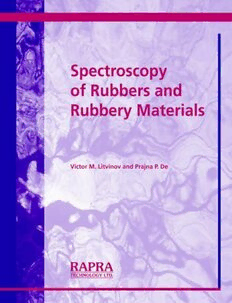
Spectroscopy of Rubbers and Rubbery Materials PDF
656 Pages·4.052 MB·English
Most books are stored in the elastic cloud where traffic is expensive. For this reason, we have a limit on daily download.
Preview Spectroscopy of Rubbers and Rubbery Materials
Description:
This book deals with the application of spectroscopic techniques for characterisation of chemical and physical structures in viscoelastic materials, such as unvulcanised elastomers and their vulcanisates, various rubbery materials and some plastics, which when blended with particular additives (plasticisers) behave like rubbers. Analysis of the rubbery materials is complicated by the fact that rubbery products, such as tyres, tubes, seals, V-belts and hoses, contain in the rubbery matrix a significant amount of various compounds, i.e., fillers, vulcanising agents, antioxidants and plasticisers. Due to the complex composition, no single technique can provide a good understanding of the effect of chemical and physical structures on the functional properties of rubbery materials. Thus spectroscopy has become a powerful tool for the determination of polymer structures. The most comprehensive information on chemical and physical structures in relation to material properties can be obtained by using a combination of macroscopic techniques and methods that provide information on the molecular level. The major part of the book is devoted to techniques that are the most frequently used for analysis of rubbery materials, i.e., various methods of nuclear magnetic resonance (NMR) and optical spectroscopy. The main objective of this present book is to discuss a wide range of applications of the spectroscopic techniques for the analysis of rubbery materials. The book brings together the various spectroscopic techniques for obtaining the following information: chemical structure of rubbery materials, network structure analysis, heterogeneity of rubbery materials, physical properties of rubbery materials, functional properties and stability of rubbery materials, processing of rubbery materials and quality control. The contents of this book are of interest to chemists, physicists, material scientists and technologists who seek a better understanding of rubbery materials.
See more
The list of books you might like
Most books are stored in the elastic cloud where traffic is expensive. For this reason, we have a limit on daily download.
